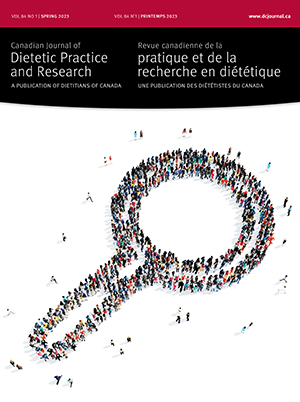Abstract
Purpose: Barriers in research for women and dietitians have been documented. We sought to describe tri-council funding awarded within the nutrition discipline according to institution type, academic rank, gender, dietitian status, and primary research methods used.
Methods: Using an online search methodology, faculty members with research appointments were identified from nutrition departments offering accredited dietetic programs and/or at Canada’s collective of research-intensive universities known as U15. All data regarding faculty members, their institutions, and funding were collected through publicly available websites and Scopus. Tri-council funding associated with the nominated principal investigator, from a 5-year period, 2013–2014 to 2017–2018, was extracted. Binary logistic regression was used to test for predictors of receiving any tri-council operating funds within the 5-year period.
Results: Faculty members (n = 237) from 21 institutions were identified for inclusion. Those from U15 institutions, at the full professor rank, nondietitians, men, and those who engaged in primarily quantitative research methods (vs. qualitative or mixed-methods) were significantly more likely to hold any tri-council funding during the eligible period. Dietitians (n = 76) were significantly less likely to hold tri-council funding, independent of institution, rank, gender, and primary research methods utilized.
Conclusions: The apparent under-funding of academic dietitians from federal tri-council sources requires exploration.
Résumé
Objectif. Les obstacles à la recherche pour les femmes et les diététistes sont documentés. Nous avons cherché à décrire le financement des trois Conseils accordé dans le domaine de la nutrition en fonction du type d’établissement, du rang professoral, du sexe, du statut de diététiste et des méthodes de recherche primaire utilisées.
Méthodes. À l’aide d’une méthodologie de recherche en ligne, des membres de corps professoraux occupant des postes de recherche ont été ciblés dans des départements de nutrition offrant des programmes de diététique agréés et/ou dans le collectif de grandes universités de recherche canadiennes, appelé U15. Toutes les données relatives aux membres de corps professoraux, à leurs établissements et à leur financement ont été recueillies à partir de sites Web publics et de Scopus. Le financement des trois Conseils associé au chercheur principal désigné, sur une période de 5 ans, de 2013-2014 à 2017-2018, a été extrait. Une régression logistique binaire a été utilisée afin de tester les prédicteurs de l’obtention de tout fonds de fonctionnement de la part des trois Conseils au cours de la période de 5 ans.
Résultats. Les membres de corps professoraux (n = 237) de 21 établissements ont été ciblés pour faire partie de l’étude. Ceux d’établissements de U15, étant professeurs titulaires, n’étant pas diététistes, étant des hommes et employant principalement des méthodes de recherche quantitatives (vs des méthodes qualitatives ou mixtes) étaient significativement plus susceptibles de détenir un financement des trois Conseils au cours de la période d’admissibilité. Les diététistes (n = 76) étaient significativement moins susceptibles de détenir un financement des trois Conseils, indépendamment de l’établissement, du rang professoral, du sexe et des méthodes de recherche primaire utilisées.
Conclusions. Le sous-financement apparent des diététistes universitaires par les sources des trois Conseils fédérales doit être exploré.



